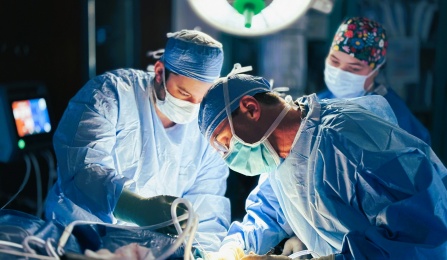Educational Curriculum

During rotations, we’ll pair you with faculty members who wholeheartedly embrace their roles as mentors. William M. Wind, Jr., MD (right), trains fellow Paul Myers, DO
Our curriculum will give you comprehensive clinical and operative experience, provide invaluable sideline and training room experience, review of the orthopedic sports medicine literature, and provide time for research and advancement of the field.
Our faculty members are committed to helping you build your orthopedic and primary care sports medicine knowledge, improving your patient care and procedural skills, and providing mentorship to build a career and Sports Medicine.
Our fellowship program at UB will help you to develop in all areas of Sports Medicine practice including:
- Obtaining a history and performing a complete physical examination for orthopedic sports injuries.
- Comprehensive surgical management for conditions in the shoulder, knee, hip, elbow, and ankle.
- Learning proper indications, risks, and limitations for surgical management, and understanding nonoperative treatment modalities.
- Managing acute care of injuries that occur during athletic competition and handling them on the athletic field and in the training room.
- Ordering and interpreting radiographic examinations that are used for diagnoses of sports injuries.
A unique aspect of our Sports Medicine fellowship is that our fellows will also receive an education in Primary Care Sports Medicine.
Fellows will interact with two Primary Care Sports Medicine fellows in training at UB. They will attend Primary Care Sports Medicine conferences throughout the course of the year where they can expect to develop expertise in the areas of:
- Non-orthopaedic conditions in sports medicine.
- Psychological effect of injuries on athletes.
- Therapeutic modalities offered in the department of physical therapy.
Educational Conferences and Lectures
We have a comprehensive fellowship conference schedule with lectures provided by the Sports Medicine faculty. There are bi-annual lectures by invited well-renowned faculty.
Rotations and Team Coverage
Each follow rotates on a one-to-one basis with Sports Medicine faculty. Office and clinical experience will be performed in a state-of-the-art multi-specialty office setting. Fellows will have access to electronic medical records and a picture archiving communication system (PACS) for case review and preparation. Fellows will spend adequate time with each faculty member with enough rotations to increase exposure to different surgical procedures.
Each fellow will spend time in team coverage for the Buffalo Bills and Buffalo Sabres gaining experience at the NFL and NHL levels. They have in-depth participation in preseason physicals, training camp, in-season game day sideline coverage, training room sessions, post-season physicals as well as the NFL combines. They also experience care of their own DIII college football team under the supervision of the Sports Medicine staff.
Research
Our program provides protected time and facilities for your research activities.
Members of our department regularly participate in prospective clinical trials, anatomic, and biomechanical studies, meta-analyses, and other projects - and we have databases for cohort and case-control studies.
With the guidance of our faculty and research team, you’ll learn to design, implement and interpret research studies. Types of research you may conduct include:
- Basic bench research
- Translational research
- Epidemiologic and/or clinical studies
- Clinical trials
We have state-of-the-art research equipment, as well as dedicated research staff to assist in your interest.
Our alumni have published work in global peer-reviewed journals. We expect you to complete a publishable research project during your year in our program.
Arthroscopy Laboratory
Our state-of-the-art arthroscopy laboratory provides fellows with the opportunity to strengthen their abilities. A structured, weekly laboratory course schedule with Sports Medicine faculty teaching is always a preferred activity of the fellows during their year of training. We also have a virtual arthroscopic simulator that allows you to learn surgical skills at your own pace and gives you opportunities to practice your skills outside of the operating room.
Director’s Welcome
Our Program at a Glance
Upcoming Events
Import medical school events to your Exchange, Gmail, iPhone or iPod calendar. Customize your calendar by selecting different event categories and receive automatic reminders of the school events that matter most to you.
